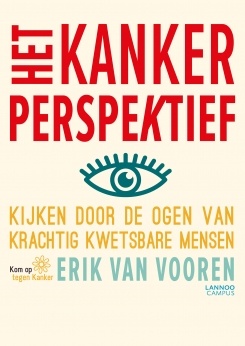During the Leadership Gathering, 21st of October 2016, Erik van Vooren presented his book Het Kankerperspektief. He wrote this book in commission of Stichting tegen Kanker (Foundation against Cancer). He interviewed 21 leaders about their experience with cancer. The book is not simply an enumeration of these stories, Van Vooren distilled a distinct model out of the testimonies which he calls ‘het kankerperspectief’.
 Is the book only interesting for managers?
Is the book only interesting for managers?
The book is certainly more widely applicable than strictly for managers. I think the insights are informative for everybody who is some kind of leader. I certainly do not want to state that everybody who is faced with this illness will be able to identify with or be inspired by the stories that I wrote down. A one size fits all does not exist.
Generally, the interviewees did not look back to their period of illness with a feeling of remorse, on the contrary, they looked at it in a positive way. Do you think this view is determined by their management function?
Indeed, they looked at their illness in a positive way. In my opinion, this has nothing to do with their management function, but with their view on life. They always try to find the silver lining, even in a period of great difficulty. They focus on opportunities and not the problems they are faced with. All the interviewees were very strong people.
Do you think it is more difficult for a manager to stop working because of illness? Do they keep on working because they cannot leave their company behind?
Generally, managers have worked hard to get where they are. Most of my interviewees did everything within their power to work as long as possible. This even went as far as needing a trash bin between two meetings. They feel responsible for their employees and they feel that their company depends on them. They cannot leave it behind immediately, but at some point they have to. I would not go as far as to say that there is fundamental difference between a manager and an employee: they as well can go far to keep working. Several interviewees mentioned that work is what kept them going. According to them there is nothing worse than being alone with your thoughts.
Do you think the survival of cancer has made the managers stronger in making decisions? Or have they become more sensitive which results in having difficulties with making decisions?
I think both statements are true. Managers show more understanding for employees when they are, for instance, ill. At the same time, they are more bold and decisive when making decisions. In my opinion, this makes them better leaders; social leaders.
This book forms the basis for your contribution to the Leader Gathering. Which aspect of your book are you going to clarify?
The information in my book is based on interviews, but I wanted to do more than just present the world with these managers’ stories. In the book I have worked out a model. In other words, I have applied a structure to these stories that I have heard. I want to pass this structure to people who are attending this gathering.
The structure is composed out of 2, 3 and 5. 2 stands for the double challenge cancer forms. On the one hand you need to accept your fate and the vulnerability you are exposed to. On the other hand, you will be able to find strength in everything around you. 3 symbolises the triple vision you acquire when faced with cancer. You are going to perceive everything deeper, wider and broader. 5 stands for the five steps we have to take: quality, core value, firm choices, clear communication, and relations.
Inspired? Read more on Leadership!


